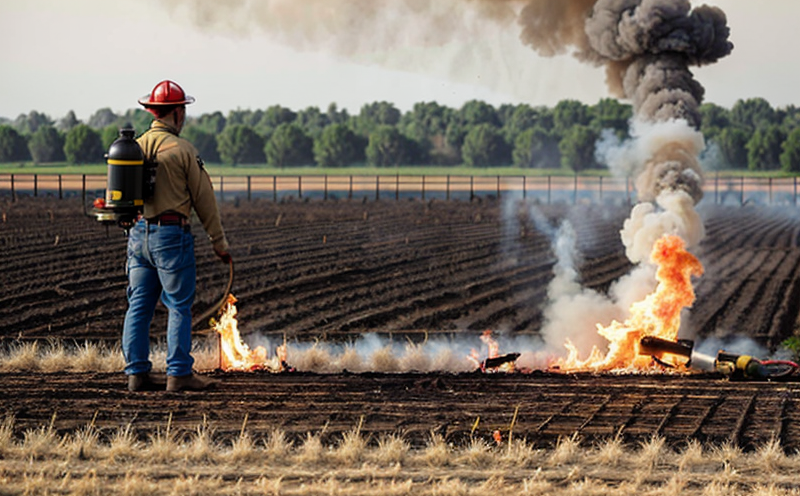Fire Prevention in Agriculture: A Comprehensive Guide
Agriculture is one of the most critical sectors that require attention to fire safety due to the high risk of fires caused by various factors such as equipment malfunctions, lightning strikes, and human negligence. Fire can have devastating consequences for farmers, including loss of crops, livestock, and equipment, as well as damage to property and environmental degradation. Therefore, it is essential for agricultural producers to take proactive measures to prevent fires on their farms.
Types of Fires in Agriculture
There are several types of fires that can occur in agriculture, including:
Wildfires: These are uncontrolled fires that spread quickly over large areas, often fueled by dry vegetation and strong winds.
Equipment-related fires: These fires are caused by malfunctioning or improperly maintained equipment, such as tractors, combines, and irrigation systems.
Building fires: Fires can occur in farm buildings, such as barns, silos, and grain storage facilities, due to electrical malfunctions, heating system failures, or human error.
Lightning strikes: Thunderstorms can bring lightning, which can cause fires on farms.
Causes of Fires in Agriculture
Fires in agriculture are often caused by a combination of factors, including:
Dry conditions: Prolonged droughts or heatwaves can dry out crops and vegetation, making them more susceptible to fire.
Human error: Farmers may inadvertently start fires while performing tasks such as discing, mowing, or burning off weeds.
Equipment malfunctions: Agricultural equipment can malfunction due to poor maintenance, worn-out parts, or electrical issues.
Lightning strikes: Thunderstorms can bring lightning, which can cause fires on farms.
Prevention Measures
To prevent fires in agriculture, farmers can take the following measures:
Maintain equipment regularly: Regular maintenance of agricultural equipment can help prevent malfunctions and reduce the risk of fires.
Store fuels and chemicals safely: Fuels and chemicals should be stored in well-ventilated areas, away from heat sources and ignition sources.
Keep dry materials separate: Dry materials such as hay, straw, and grain should be kept separate from other combustible materials.
Implement firebreaks: Firebreaks can be created by removing flammable vegetation or using non-combustible barriers to contain fires.
Preparation and Response
While prevention measures are crucial, it is equally important for farmers to prepare for and respond to fires when they occur. Farmers should:
Develop an emergency plan: An emergency plan should outline procedures for preventing, detecting, and responding to fires.
Install fire detection systems: Fire detection systems can help identify fires early, allowing farmers to take prompt action.
Have a firefighting plan: A firefighting plan should include information on equipment, personnel, and resources needed to combat fires.
Additional Safety Measures
In addition to the above measures, farmers can also consider implementing additional safety measures, such as:
Installing fire-resistant roofing: Fire-resistant roofing materials can help prevent fires from spreading to other parts of the farm.
Using electrical safeguards: Electrical safeguards such as ground fault circuit interrupters (GFCIs) and arc fault circuit interrupters (AFCIs) can help reduce the risk of electrical fires.
Implementing fire suppression systems: Fire suppression systems can be installed in high-risk areas, such as grain storage facilities or fuel tanks.
Detailed Information on Fire Prevention Measures
Regular Equipment Maintenance
Maintaining equipment regularly is crucial to preventing malfunctions and reducing the risk of fires. Some key steps for regular maintenance include:
Checking fluid levels: Regularly check fluid levels in tractors, combines, and other agricultural equipment to ensure they are at the recommended levels.
Replacing worn-out parts: Worn-out parts can cause equipment malfunctioning, leading to fires. Replace parts such as filters, hoses, and belts regularly.
Cleaning debris: Clean debris from equipment regularly to prevent it from accumulating and causing malfunctions.
Performing routine inspections: Perform routine inspections of equipment to identify potential issues before they become major problems.
Safe Storage of Fuels and Chemicals
Proper storage of fuels and chemicals is essential to preventing fires. Some key steps for safe storage include:
Storing in well-ventilated areas: Store fuels and chemicals in well-ventilated areas, away from heat sources and ignition sources.
Labeling containers: Label containers clearly with the contents, date, and any relevant safety information.
Securing containers: Secure containers to prevent them from tipping over or being knocked over.
Regularly inspecting storage facilities: Regularly inspect storage facilities for signs of damage, leaks, or other hazards.
QA Section
Q1: What are the most common causes of fires in agriculture?
A1: The most common causes of fires in agriculture include dry conditions, human error, equipment malfunctions, and lightning strikes.
Q2: How can farmers prevent fires caused by equipment malfunctions?
A2: Farmers can prevent fires caused by equipment malfunctions by maintaining equipment regularly, checking fluid levels, replacing worn-out parts, and cleaning debris.
Q3: What are some safety measures that farmers can take to protect themselves from fire-related injuries?
A3: Some safety measures that farmers can take to protect themselves from fire-related injuries include wearing personal protective equipment (PPE), following proper procedures when handling fuels and chemicals, and staying alert when working in high-risk areas.
Q4: What is the role of firebreaks in preventing fires in agriculture?
A4: Firebreaks play a crucial role in preventing fires in agriculture by creating barriers to contain fires and prevent them from spreading. Firebreaks can be created by removing flammable vegetation or using non-combustible barriers.
Q5: How can farmers develop an emergency plan for responding to fires on their farms?
A5: Farmers can develop an emergency plan by outlining procedures for preventing, detecting, and responding to fires, identifying key personnel and resources needed, and conducting regular drills and training exercises.

































